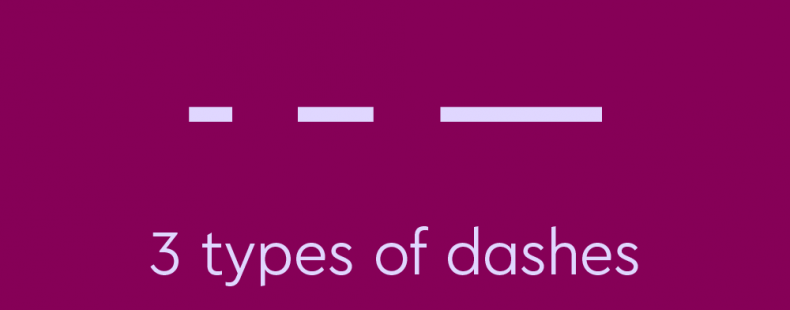In writing, we use three different types of dashes: the hyphen, the en dash, and the em dash. This may come as a surprise to many as the hyphen tends to dominate the spotlight. After all, the hyphen is the only dash that makes it onto most keyboards. Considering that the pipe symbol—the what?—makes it onto the keyboard, the other dashes clearly don’t get enough respect. We are going to change that and give each of these dashing punctuation marks a chance to show us how useful they are.
Types of dashes
In writing, there are three different punctuation marks that most people refer to as dashes. These are the hyphen, the en dash, and the em dash.
Hyphens
The hyphen is the dash that writers are likely most familiar with because it has a very common usage: compound words. Many compound words need a hyphen, or they are considered grammatical mistakes. For example, jack-in-the-box is an actual word whereas “jackinthebox” is not. There are a few different rules regarding using hyphens to form compound words, which you can learn more about in our detailed coverage of hyphens.
Sometimes, hyphens are also used to signal line breaks in certain types of writing. The hyphen indicates that a single word has been split apart so that a reader isn’t confused by chopped up words.
Hyphen examples
The following examples show how we typically use hyphens to make compound words:
- Our baseball team has three left-handed batters.
- There are twenty-six birds in that tree.
- During the war, the government produced anti-American propaganda.
- My daughter’s favorite ride is the merry-go-round.
En dash (–)
The en dash is slightly longer than a hyphen. Most keyboards don’t have a key to type an en dash, and you’ll usually need to insert it as a special character.
En dashes have several different common uses. En dashes are used to represent ranges, especially ranges of numbers:
- For homework, read pages 35–50.
En dashes are also used to indicate a close relationship between two things:
- He served during the Iran–Iraq War.
Finally, en dashes are sometimes used in complex compound words, such as a compound word that includes a proper noun with spaces in it:
- She was an expert in World War II–era literature.
En dash examples
The following examples show the different ways we can use en dashes:
- Barack Obama (2009–2017) was America’s 44th president.
- We took the Monday–Friday bus to the airport.
- They drove across the Spain–Portugal border.
- He was a collector of South Korea–style artwork.
Em dash (—)
The em dash is the longest of the three dashes. Like the en dash, you usually need to insert it as a special character because it doesn’t appear on most keyboards.
The em dash is an interesting punctuation mark. Rather than have its own unique uses, it typically takes the place of certain other punctuation marks: namely commas, parentheses, colons, and semicolons.
In general, the em dash is seen as being more informal than these other punctuation marks. Most writers use em dashes for stylistic reasons; the em dash is a particularly striking character, so a writer will often use one to draw a reader’s attention.
Em dash examples
The following examples show em dashes swapping in for other punctuation marks.
- Commas: Alexander the Great—a king among kings—led a nearly unstoppable army.
- Parentheses: Kevin—that heartless scoundrel!—refused to pet the kitten.
- Colon: They opened the door and found the intruder—a zombie!
- Semicolon: The mirror confirmed what she had always known to be true—she was a vampire.
✏️ En dash vs. em dash
Although their names are very similar, en dashes and em dashes cannot be used interchangeably. Summing up what has been mentioned already, these are the jobs of the two different dashes:
- En dash: Expresses ranges, relationships, and is used in some compound words.
- Em dash: Can replace commas, parentheses, colons, and semicolons.
See? Totally different. Let’s see if you’ve learned the difference with a few examples. Look at each of the following sentences and see if you can figure out which dash should be used. (See the answers at the end.)
- I have to clean Aisles 4 (–/—) 9.
- Tomorrow is Halloween (–/—) my favorite holiday!
- The heavy snows delayed the Denver (–/—) Chicago flight.
- He was eating pineapple pizza (–/—) gross! (–/—) when I last saw him.
Don’t dash off! Try Grammar Coach™
Not sure if you’re using the hyphen, en dash, or em dash correctly? Check your writing on Thesaurus.com’s Grammar Coach™. This writing tool uses machine learning technology uniquely designed to catch grammar and spelling errors. Its Synonym Swap will find the best nouns, adjectives, and more to help say what you really mean, guiding you toward clearer, stronger, writing.
Answers: 1. En dash 2. Em dash 3. En dash 4. Em dash















